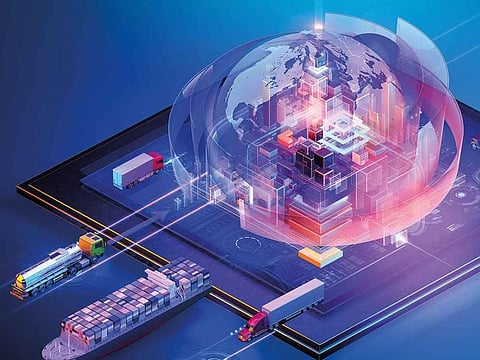Winds of opportunity in the maritime and logistics sector
Industry experts discuss strategic future trends

“We have committed to electrifying a portion of our fleet.”
Tim Coffin, CEO, Tristar Eships, the Maritime Logistics Division of Tristar Group

Navigating regulatory requirements related to environmental sustainability can be complex. How does Tristar ensure compliance with global and regional regulations in shipping while balancing growth and operational efficiency?
The increasingly robust regulatory environment applicable to the shipping industry – and indeed all carbon-intensive industries – requires a greater commitment to compliance than we have had previously. We approach this challenge as an opportunity to further improve our culture and our systems. For this reason, we have established an in-house technical management function. By mastering the current and upcoming regulation ourselves, we improve our business intelligence to determine the best strategic course. Looking ahead, aligned with our principles and those expressed in our regulatory environment, we continue to work towards improving the well-being of our seafarers, whose front-line decisions are crucial for our success. That is why we have established a function focused solely on seafarer happiness. So adherence to the principles behind regulatory compliance is not a separate administrative burden, but part of our business culture, which we believe is a meaningful competitive advantage.
How do you foresee the shipping industry evolving over the next decade and what trends or developments are likely to drive growth and transformation within the industry?
Our industry is facing three challenges which will fundamentally change how it functions. First, we are focused on reducing the quantity of harmful emissions from the fuel we burn. At Tristar, we have committed to electrifying a portion of our fleet and our first new build electrically-powered vessel is currently under construction. Second, we recognise that demographic and economic change reduces the number of potential seafarers from traditional sources. So by recruiting women to our crews, we have doubled the size of the pool from which we can draw talent. Finally, along with emissions reduction, it is critical to better analyse data. Communication gets cheaper and data science gets better, so we have an opportunity to be much smarter in how we operate our fleet.
“Real-time information enables companies to make informed decisions”
Rajesh Narayanan, Business Head, Shahn

What demand have you noticed for truck-on-demand services in the UAE and how is Shahn transforming the UAE’s commercial transport segment?
The demand for on-demand truck services in the UAE is rapidly increasing, driven by the growth of the e-commerce sector and the need for efficient last-mile delivery solutions. According to Statista, the UAE’s road freight transport market is projected to grow by 4.72 per cent annually between 2023 and 2028. Shahn is transforming the UAE’s commercial transport segment by providing a reliable and cost-effective alternative to traditional truck ownership or leasing. By leveraging technology and data-driven insights, Shahn enables businesses to optimise their logistics operations and adapt to the dynamic market conditions.
Supply chain companies often leverage the power of data analytics to make better decisions and optimise their business. How does Shahn’s technology enable companies to gather accurate data and navigate through potential transit challenges swiftly?
Shahn’s technology empowers businesses to gather accurate data on truck locations, delivery times, and potential bottlenecks. This real-time information enables companies to make informed decisions, proactively address transit challenges, and achieve cost reductions. By fostering transparency and efficiency in the supply chain, Shahn contributes to the overall competitiveness of businesses operating in the UAE, aligning with the goals of the Dubai Industrial Strategy 2030.
“DSV is actively using robotics to increase efficiency.”
Rasmus Clausen, Managing Director, Dubai and Iraq– Air & Sea, DSV Global Transport & Logistics

Could you share a couple of recent examples of DSV’s initiatives that have helped the maritime and logistics industry drive its sustainability agenda?
Recently, DSV launched a green logistics programme to improve energy efficiency and reduce waste in our warehouses. In Dubai, we are implementing EV trucks for airfreight and ocean container trucking, offering sustainable fuel options, and providing detailed CO2 emission data per shipment. These steps support our ongoing efforts to promote energy efficiency and reduce emissions.
What are the key trends in digitalisation within logistics, and how is DSV adapting?
Digitalisation in logistics is growing with trends like blockchain for transparent transactions, automated warehouses, and advanced analytics for forecasting. DSV is actively using robotics to increase efficiency and reduce manual labour, and AI tools for precise customs clearances. Our focus on digital transformation helps us stay flexible and responsive in a constantly evolving market.



